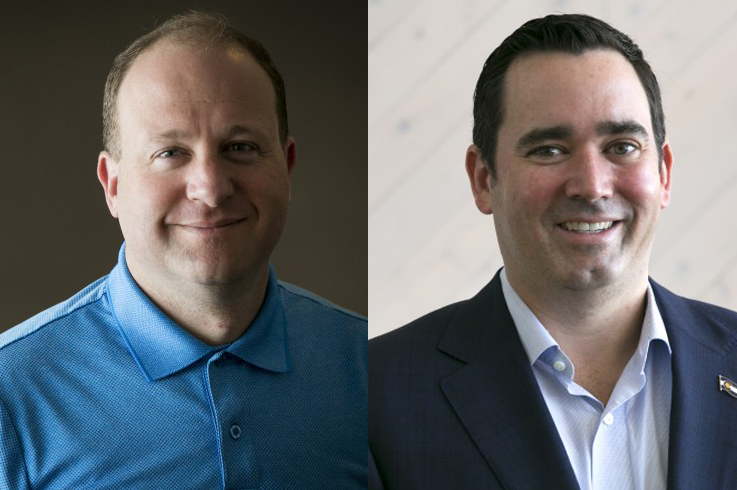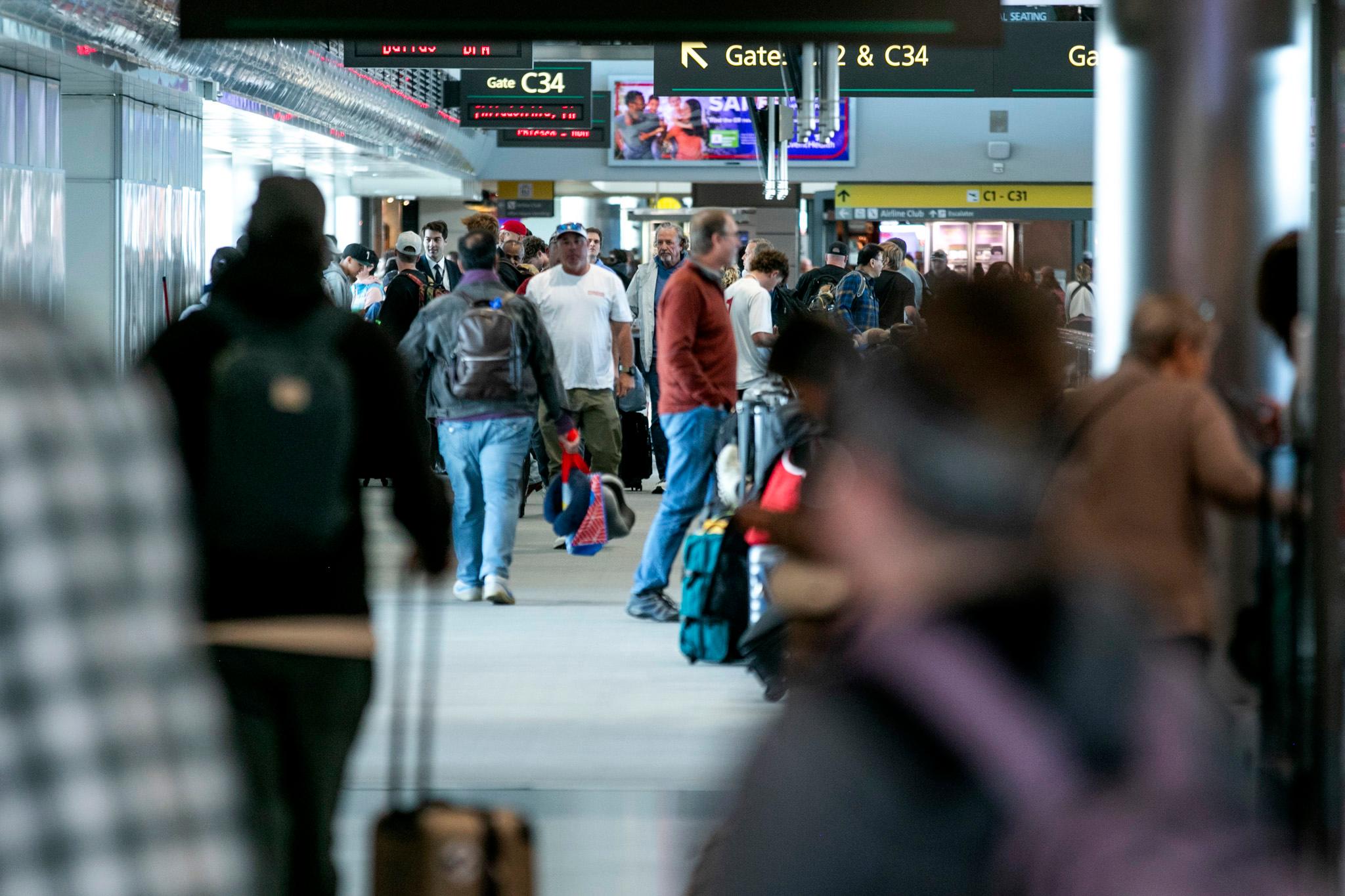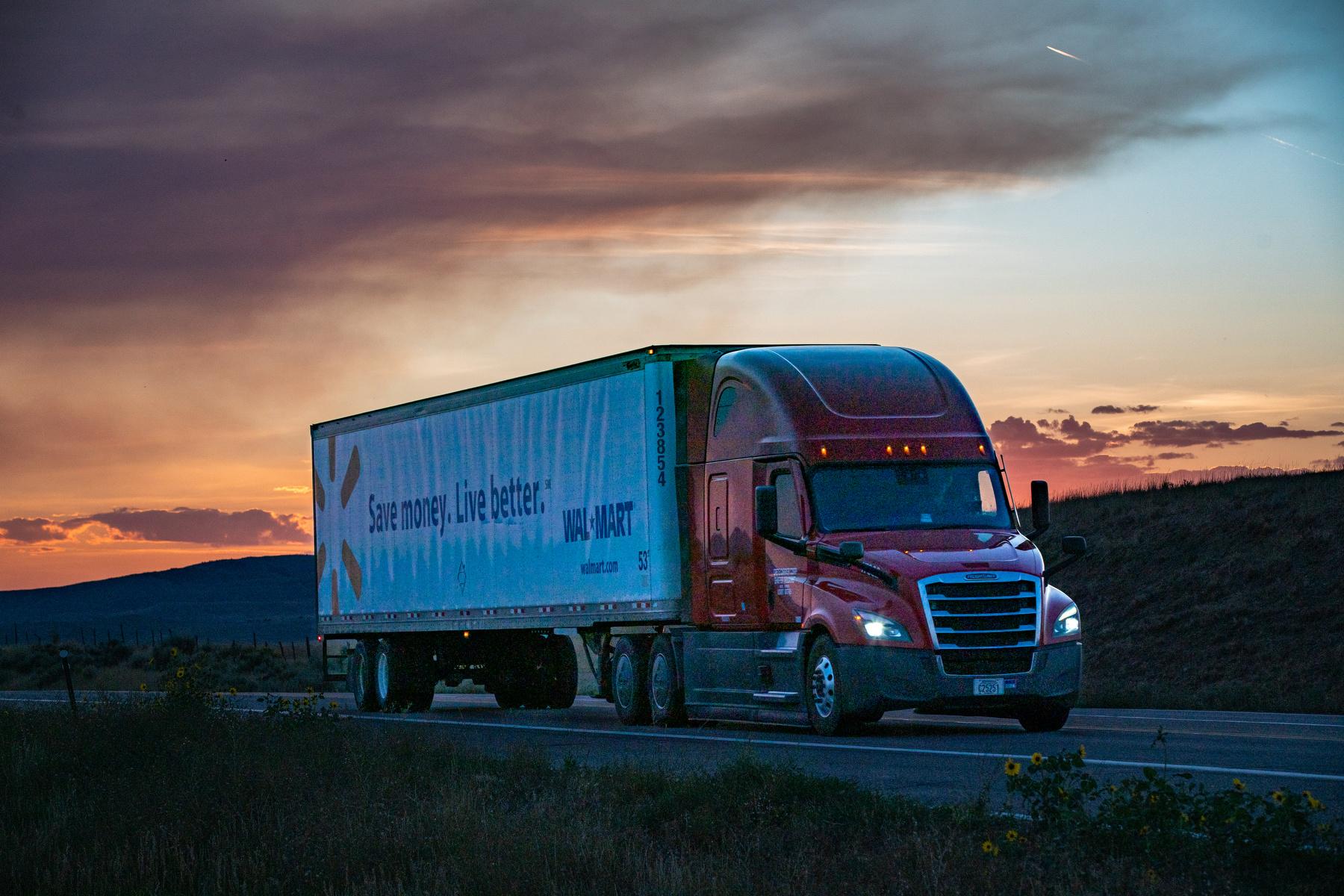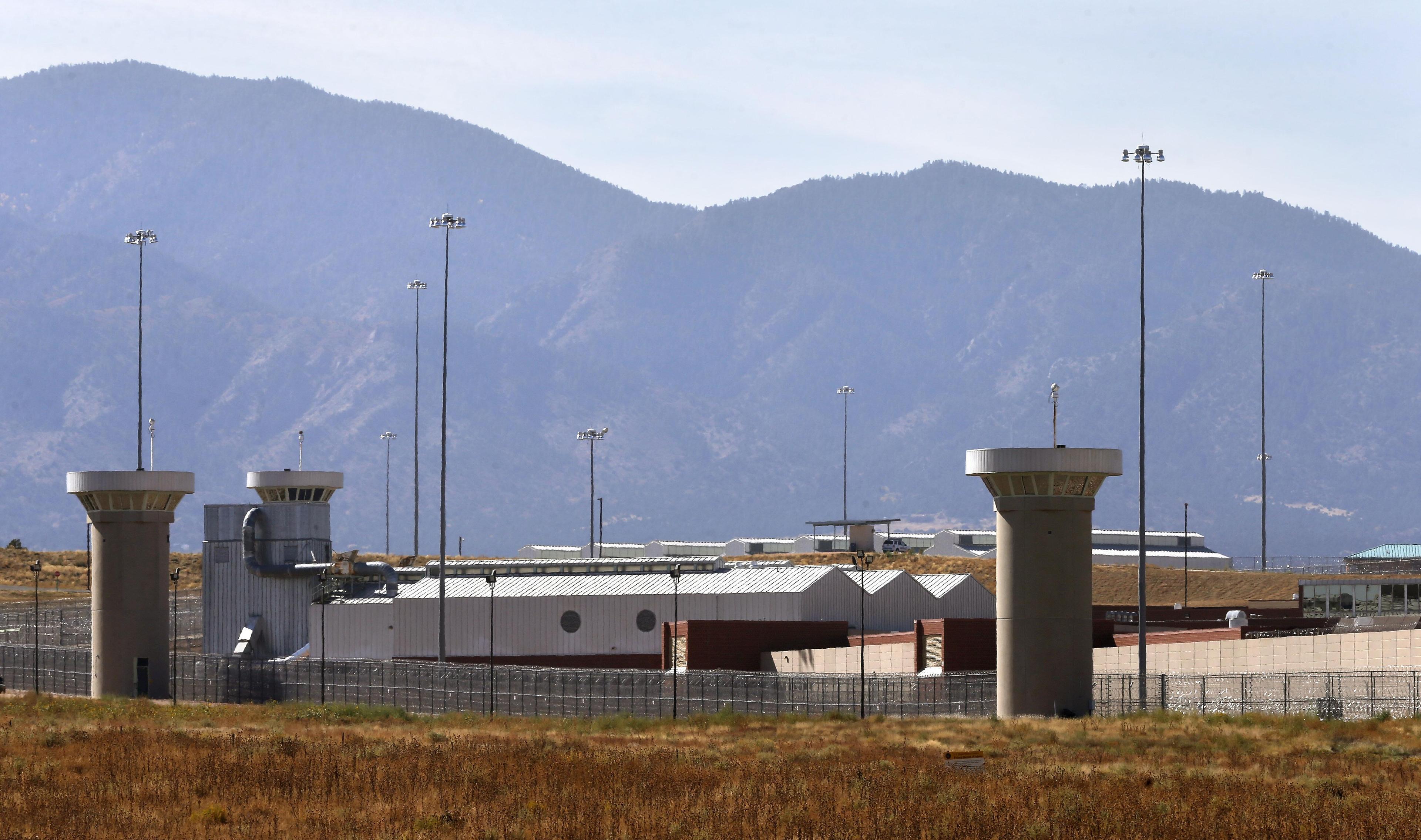
Colorado Gov. John Hickenlooper took the candidates vying to replace him to task Wednesday, saying there are signs that the race for the Governor's Mansion could be a nasty one.
"They haven't gotten off on a good foot, as my grandmother used to say," the governor said of Democrat Jared Polis and Republican Walker Stapleton, who won primary victories in June. "They didn't immediately go to their vision of Colorado, and their positive goals and dreams for the state — they were quick to attack each other. I think that's a potential harbinger of a pretty nasty campaign."
“He knows how I feel," the governor said of Polis. "I think his feeling is, if there's going to be a brawl, if he's going to be getting punched, he's going to punch back. And I think, as is often the case, everybody says that. Both sides are 'who punched first,' right?"
Hickenlooper acknowledged that in an open election, like we're seeing now, it's a more difficult prospect. The key for the current governor is the electorate. He said that "if more people ask for positive campaigns, are vocal in their complaints about the attack ads, I think you can change the culture of a state, and make negative ads less successful."
Elsewhere in the far ranging interview, Hickenlooper spoke to why Lt. Gov. Donna Lynne didn't do better in the Democratic primary, on whether his attending the Bilderberg conference in Italy indicated presidential aspirations, Front Range businesses moving elsewhere in the state and how he believes market economics support renewable energy, despite President Trump’s policies.
Hickenlooper also said the state is already over-budget for wildfire fighting, “and we're going to have to go back and true-up with the General Assembly.”
Interview Highlights With Gov. John Hickenlooper
On Lieutenant Gov. Donna Lynne's Democratic primary performance:
"I think in this day and age, there is a sense of alienation from the public. People feel that government isn't serving them the way they want to be served. I think they feel estranged from government, in many ways. Certainly that's focused on Washington, but I think it's true to a certain extent. I think it's also, in a funny way, the nature of democracy.
And when Donna Lynne, I mean she was late to get into the campaign. So she knew she was going to have, be a little bit of a long shot. But we talked about, in a democracy, people almost always want a change from what they've just had. No matter how successful our economy, no matter how well we've done over the last eight years, there's always an inclination in the electorate that, 'Yeah, Hickenlooper was OK. He was great. No, we love him. But we want something different.'"
On whether his attending the Bilderberg Group conference in Italy indicated presidential aspirations:
“It's a weekend thing, and I paid my own way. I used vacation time to go because I didn't, I wasn't sure that, I do think it's useful to the people of Colorado, and to the state. These are the smartest people in Europe, and the smartest people United States talking about the economy, nationalism, they're talking about trade. … You get invited, and you don't get invited by a specific person. You're invited by the Secretary General, who's in charge but you don't know who in that group decided that you are someone that needed to be there. But I do think, being in those situations and talking about the stuff that Colorado has achieved, that our economy went from 40th to first, getting a chance to talk about that. All these really smart, very experienced people then get to hear about, well here's why Colorado is a different place than many other states."
On the website The Hill reporting he and his wife Robin Pringle will try and sort through possible presidential run this summer:
"The sorting's just fine. I mean, we really hadn't thought about it at all, and I think, at a certain point, you have to say, 'Well, I'm going to consider it.' At this point, we're sorting through it. That's different than considering it. … Politics, with all the cable news and all the shows like this one, Ryan, people are paying more attention to politics than they did before. In a situation like this where there's a lot of division and conflict around President Trump, whether he's on our side or the Russians' side or all these different issues that kind of get people's interest, I think there are probably 30 people on the Democratic side who are being discussed. There's this kind of curiosity about are they going to run, are they not going to run. It's not like I'm an exclusive company."
On whether companies moving from the Front Range is good redistribution within the state, or a sign that Metro Denver is just getting too expensive.
"I call it spillover. There's so many people coming into Colorado, and especially coming into Metro Denver and increasingly Fort Collins, Colorado Springs, Pueblo. I think that spillover, getting to the West Slope, and also to some of these people moving out onto the Eastern Plains, that's very healthy for the state. … If people are feeling Metro Denver's too congested, and they want to get a little more space, less congestion, get to know their neighbors a little better, that they can do that by going out an hour and a half from Denver or going out to the West Slope. That's a good thing."
On whether the state needs to be budgeting more for the effects of climate change and wildfire fighting:
"Well, there are two things going on. One is that we probably are going to need to budget a little more, although I'll tell you this bluntly. I think when you budget more, you end up spending more. What we've tried to do is budget conservatively. I think our budget this year is $25 million, and so far the state's share of expenditures is probably closer to $36 million. … We're already over-budget, and we're going to have to go back and true-up with the General Assembly.
I think the second question that is worth asking is, is the money worth spending really being assessed appropriately? In other words, are we spending money where we're really saving property values and making sure we don't have loss of life. Things worth looking at. We've had a lot of, I mean, the fourth largest wildfire in the history of the state and we had no loss of life. I'll knock wood here."
President Trump recently ordered the Department of Energy to prepare to stop coal and nuclear energy plants from closing. What would it that look like for Colorado?
"I don't see that his instructions are going to have much of an impact in Colorado. … Long-term, I think society is always going to choose cleaner sources of energy if they're at the same price or cheaper and as reliable. Certainly wind and solar are very reliable. Again, the wind doesn't blow all day every day, but if you average it week by week, it's pretty consistent. It's remarkably consistent. … Right now, you go to wind and solar, it's less expensive. People's utility bills or electric bill at home is going to go down and they're going to have cleaner air and they're going to have just as reliable a system as they had before. Who's not going to want to vote for that?"
Read The Full Transcript
Ryan Warner: Governor, thanks for being with us. Gov. John Hickenlooper: Thanks for having me. RW: Since we last spoke, voters chose Democrat Jared Polis and Republican Walker Stapleton in the gubernatorial primaries. And immediately from the podiums, where they gave their victory speeches, these men started taking shots at each other. Stapleton saying that Polis was trying to buy the job, by spending his own money. Polis asserting that Stapleton was beholden to President Trump. You were behind the Clean Campaign Pledge during the Democratic Primary. And in 2010, you famously took a shower, several in fact, with all your clothes on. [Voice of John Hickenlooper: I'm John Hickenlooper, and I guess I'm not a very good politician because I can't stand negative ads. Every time I see one, I feel like I need to take a shower.] RW: All of this made me wonder what your thoughts are about the tone of the gubernatorial race thus far? JH: Well they haven't gotten off on a good foot, as my grandmother would say. I think we'll see. RW: What makes you say that? JH: Well, just because they were quick to attack each other. And I think that's potentially a harbinger of a pretty nasty campaign, and we'll just have to see. RW: And one of the men you are endorsing is one of the ones slinging mud. Have you talked to Jared Polis about this? JH: Oh he knows how I feel. I think his feeling is, if there's going to be a brawl, if he's going to be getting punched, he's going to punch back. And I think, as is often the case, everybody says that. Both sides are who punched first, right? Generally, I was proud that we got as far in that primaries we did with as little negative advertising. RW: Among the Democrats. JH: Among the Democrats, exactly. In open election like this, it's more difficult. I think the key, and your listeners to this show are going to be important in this, if more people ask for positive campaigns, are vocal in their complaints about the attack ads, I think you can change the culture of a state, and make negative ads less successful. RW: One of the candidates on the Democratic side, Donna Lynne, is your lieutenant governor. And she ran a campaign that appeared to be, a continuation in many regards, of your own administration. She finished fourth, among the four candidates in that race. Why do you think she didn't do better? JH: I think in this day and age, there is a sense of alienation from the public. People feel that government isn't serving them the way they want to be served. I think they feel estranged from government, in many ways. Certainly that's focused on Washington, but I think it's true to a certain extent. I think it's also, in a funny way, the nature of democracy. And when Donna Lynne, I mean she was late to get into the campaign. So she knew she was going to have, be a little bit of a long shot. But we talked about, in a democracy, people almost always want a change from what they've just had. No matter how successful our economy, no matter how well we've done over the last eight years, there's always an inclination in the electorate that, "Yeah Hickenlooper was okay. He was great. No, we love him. But we want something different." RW: I wonder if she thought the connection to you was actually going to be a strength in the race whereas your interpretation is it might have weakened her? JH: Yeah, I'm not sure it weakened her. But I'm not sure it helped her. I think she was hoping that that connection would be more benefit than it probably was. RW: Speaking of campaigning, you recently attended the annual Bilderberg Group Conference in Italy. Ostensibly, it's a think tank that chews over global issues, and you're there to engage in that. A bit of late, the conference has been equated with presidential politics here in the U.S. The idea that being in attendance is a precursor to a run for president. How did you come to participate in Bilderberg? What did you get out of it for the people of Colorado is what I'm interested in too? JH: Well, I took, again, it's a weekend thing, and I paid my own way. I used vacation time to go because I didn't, I wasn't sure that, I do think it's useful to the people of Colorado, and to the state. These are the smartest people in Europe, and the smartest people United States talking about the economy, nationalism, they're talking about trade. RW: Are you including yourself in that? JH: No. That's why I was saying, I was surprised I got invited. RW: So you were invited. JH: You get invited, and you don't get invited by a specific person. You're invited by the Secretary General, who's in charge but you don't know who in that group decided that you are someone that needed to be there. But I do think, being in those situations and talking about the stuff that Colorado has achieved, that our economy went from fortieth to first, getting a chance to talk about that. All these really smart, very experienced people then get to hear about, well here's why Colorado is a different place than many other states. RW: It is the perennial question with you. The Hill reported in June that you said you and your wife, Robin Pringle, will try and sort through it this summer. It being a presidential run. How's the sorting going? JH: The sorting's just fine. I mean, we really hadn't thought about it at all, and I think, at a certain point, you have to say, "Well, I'm going to consider it." At this point, we're sorting through it. That's different than considering it. RW: Uh huh, okay. JH: I don't, obviously, we are- RW: Do you wonder why people are obsessed with this question? Do you think it's a media obsession or a popular obsession? JH: Oh, I think maybe a little bit of both. Politics, with all the cable news and all the shows like this one, Ryan, people are paying more attention to politics than they did before. In a situation like this where there's a lot of division and conflict around President Trump, whether he's on our side or the Russians' side or all these different issues that kind of get people's interest, I think there are probably 30 people on the Democratic side who are being discussed. There's this kind of curiosity about are they going to run, are they not going to run. It's not like I'm an exclusive company. RW: No. JH: And I think if you were to ask any odds-maker, even if I were going to run, I'd be a 3 percent or a 5 percent chance of success. I'd be a long-shot. RW: Would you ever run with a Republican on the ticket? I think of your relationship in office as governor with Gov. Kasich of Ohio, for instance, and I wonder if that has occurred to you and if it's something that you feel could happen. JH: Well, you know, I admire and respect Gov. Kasich tremendously. I have a great affection for the man. He's funny, right, and he's smart. As much as I appreciate and think it's important that we do healthcare issues together and that we find compromises where we disagree on issues of national significance, I don't think we could ever run together on the same ticket. A, I think it would be symbolic and ... RW: And who would be Veep and who would be President? JH: Right, that would be a sticky issue. RW: Okay. JH: And, you know, there are certain issues we do really, on a basic level, disagree about. But I do, I mean, I think it's important that we have opportunities to see Republicans and Democrats working together to find compromises on issues like healthcare or the environment. RW: So Colorado Matters recently did a pair of shows from the Western Slope. We profiled a business owner who had moved his operation from Denver to Grand Junction. Kevin Molik builds teardrop trailers that you camp in, and he had to have room to grow. [Voice of Kevin Molik: If I needed to double my space, I was going to more than double my rent. Traffic also just drove me crazy. RW: It's a quality of life question. Kevin Molik: Yeah.] RW: And he's not alone. It was big news when RockyMounts, which makes bike racks, announced it was relocating from Boulder to Grand Junction. How do you see moves like that? Is it a good redistribution within the state, or is it a sign that Metro Denver is just getting so expensive that it's now beginning to lose out? JH: I look at it as a good thing. I call it spillover. There's so many people coming into Colorado, and especially coming into Metro Denver and increasingly Fort Collins, Colorado Springs, Pueblo. I think that spillover, getting to the West Slope, and also to some of these people moving out onto the Eastern Plains, that's very healthy for the state. It's interesting. Many people in Metro Denver think it's too crowded. They think there's too much traffic, there are too many people. And many people in Morgan County or Julesburg or Grand Junction or Craig, they think they need more people. So if people are feeling Metro Denver's too congested, and they want to get a little more space, less congestion, get to know their neighbors a little better, that they can do that by going out an hour and a half from Denver or going out to the West Slope. That's a good thing. RW: Around the state, there's relief that we are in monsoon season, those afternoon rains that quell the vicious wildfires we've seen. Climate change means it's getting hotter and drier. We recently talked to a scientist, in fact, who says that we should ditch the word "drought" because the dryness is just a way of life now. Does the state need to be budgeting more for the effects of climate change and is that the lens that you see these wildfires through? JH: Well, there are two things going on. One is that we probably are going to need to budget a little more, although I'll tell you this bluntly. I think when you budget more, you end up spending more. What we've tried to do is budget conservatively. I think our budget this year is $25 million, and so far the state's share of expenditures is probably closer to $36 million. RW: $25 million for wildfires? JH: Right, for fire suppression. RW: You're already over-budget? JH: We're already over-budget, and we're going to have to go back and true-up with the General Assembly. I think the second question that is worth asking is, is the money worth spending really being assessed appropriately? In other words, are we spending money where we're really saving property values and making sure we don't have loss of life. Things worth looking at. We've had a lot of, I mean, the fourth largest wildfire in the history of the state and we had no loss of life. I'll knock wood here. RW: We're talking about the Spring Creek fire. JH: Yes. It certainly could have been much worse. That being said, that wasn't where we spent all the money. We spent most of the money out around Durango. That was the largest expenditure on fires and we clearly didn't have as many homes, as much risk there, and yet, there we spent tens of millions of dollars. RW: At the 416 Fire. JH: At the 416 Fire. At some point I'm hopeful that we will look at on a day by day basis how we are spending the money to fight fires and are we really spending that money wisely? In other words, sometimes, and people hate it when I say this, but sometimes in certain fires we should let them burn and have a natural burn through the forest. A lot of people think that makes the forest healthier, but anyway, I do think that we are in a long-term period of drier conditions and we probably should budget more and probably part of that should be making sure that we have money to address flood potential. After we've had fires, how do we make sure we repair the landscape. RW: You're listening to Colorado Matters. I'm Ryan Warner and we're at the State Capitol for our regular conversation with Colorado's Governor, John Hickenlooper. President Trump recently made a push to keep coal and nuclear power plants open, telling the Department of Energy to prepare immediate steps to stop them from closing. If those plans indeed proceed, what would that look like for Colorado, which has moved more and more from coal to natural gas? JH: Well we've still got a couple coal plants. I think at this point we have less than a thousand employees working in coal mines in Colorado, so we're not a big player. We do have some very high value coal that is sought after by various commercial enterprises. I don't see that his instructions are going to have much of an impact in Colorado. RW: And as for coal fired plants? JH: Well, long-term, I think society is always going to choose cleaner sources of energy if they're at the same price or cheaper and as reliable. Certainly wind and solar are very reliable. Again, the wind doesn't blow all day every day, but if you average it week by week, it's pretty consistent. It's remarkably consistent. RW: Do you think the market will speak here louder than the administration? JH: Yeah, I think this is a classic situation. Right now, you go to wind and solar, it's less expensive. People's utility bills or electric bill at home is going to go down and they're going to have cleaner air and they're going to have just as reliable a system as they had before. Who's not going to want to vote for that? At this point, we can guarantee every one of those workers in a coal fired plant or in a coal mine at least as good of job, if not a better job. RW: You could guarantee that? JH: Oh, yeah. I mean they're... RW: That's a claim. JH: Yeah, there's so many, we are so short in terms of trained technical people. In other words, electricians, welders, people like that, there is such a shortage both nationally and in Colorado that I think, I mean, I'm sure that they'll be some people that for whatever reason can't find as good of job as they had, but by far most people can. RW: After some retraining. JH: Yeah, of course some retraining, but that's been the history of the world, right, that we've been retraining ourselves or sometimes having to move one place to another to seek a better life. RW: I want to stick with another federal issue. The FDA recently approved a drug derived from cannabis called Epidiolex. It's used to treat childhood epilepsy. Before it can be prescribed though, the drug enforcement agency would have to reclassify cannabidiol, which isn't psychoactive. It can come from hemp. It got us thinking about Colorado's hemp crop. According to the Denver Post, there were about 9,000 acres harvested last year. What help, if any, do you place on hemp in Colorado? JH: Well, you know, I was a skeptic to be honest. Canadians have been growing hemp for a while, I wasn't sure the market would be that large, but now having been out in rural Colorado and talked to some of the hemp growers, they're pretty excited and they're doing very well. RW: Despite the fact that there's still the federal prohibition. JH: Exactly. So they're having to look at a restrained market and yet, they want to grow more and more hemp if the laws were reasonable. Right? There's no drug inducement in this hemp. There's no THC, or a minimal amount, nothing you could ever notice, and yet for a variety of reasons this turns out to be a product that's much in demand. Let's open the floodgates. I mean, Colorado right now dominates in the US the production of hemp and we're already a leader, we're looking at a number of innovations. You go talk to Don Brown. RW: Commissioner of Agriculture. JH: Our wonderful Commissioner of Agriculture. He wouldn't say this, I'll say this for him. I think he probably was, not as skeptical as I was, but a little skeptical, and yet now he looks at hemp farmers and says this is a new crop. This is a cash crop that has every indication of being here for the long term. RW: Governor, thank you for being here with us. JH: You bet. My pleasure. Thanks for having me. |









